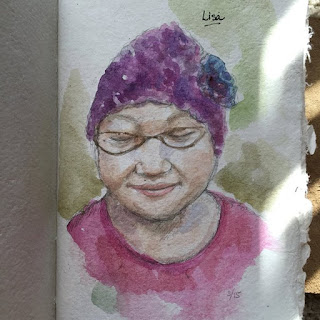Dateline: Purgatory, Examining the Case That Sentenced Darlie Routier to Death by Kathy Cruz
- True Crime
- Texas Christian University Press Ft. Worth, Texas
- April 13, 2015
- 217 pgs.
There used to be a customer at the library who always came in to check out only true crime fiction. She wore dark glasses, a bad synthetic black wig and white gloves no matter what month or how hot it was on the calendar. In Texas, that's 10 out of 12. Anyway, whenever I think of readers of this genre, I think of this mysterious lady who is either the most morbid of characters or else secretly starring in her own true crime adventure and is looking for ideas. Either way, frightening. I consider myself neither so I began this book with more than a little trepidation.
I can't honestly say that I remember this case, which took place here in Texas on June 6, 1996, cleverly, but perhaps unfortunately, labeled "the 6-6-6 murders," which is probably a bad idea if you're trying to find reason to exonerate Darlie Routier, not associate the woman with evil. As author Kathy Cruz reminds us in the first few chapters, Darlie and her husband, Darin, along with their three young sons, Damon, Devon and baby Drake, lived in the Dallas suburb of Rowlett, near Plano. The police report states that 26 year old Darlie claimed she was awakened in the early morning of June 6, 1996 to some disturbance. What happened after that is confusing and jumbled, at least in the book. Darin, who was sleeping upstairs, says he heard his wife scream and found his two older sons stabbed, blood everywhere and his wife hysterical, bleeding from knife wounds. Eventually, no spoiler here, Darlie was found guilty of the murders of both boys and sentenced to death by lethal injection. Almost twenty years later, uncharacteristic of other female murderers, she insists that she is innocent. Intruders, she says, in the house not only committed the killings but also injured her by slashing her throat and cutting her arm almost to the bone, for which she spent several days recovering in the hospital. In the years since the murders, speculation has strengthened regarding the involvement of her husband, Darin, whose shady financial woes and violent temperment could clarify Darlie's murky motive issue. For whatever reason, this angle was never thoroughly investigated. Darlie went to prison. Darin remains free. If Darlie is innocent, who is she covering for? Why didn't Darlie tell anyone but one close relative that she sprung some potentially volatile news on Darin the evening of the murders?
My gripe about the book is that there is no set timeline to the narrative. Chapter 1 starts with the crime, but then skips around from interview of Barbara Davis, another true crime writer who initially characterized Darlie as guilty but now regrets her book's influence on Darlie's sentence to random stories about how broken the Texas justice system is. In some ways, I feel like this book was not so much about Darlie Routier's innocence as much as how how poorly the case was handled by everyone all around, including Darlie's family. The moral Ms Cruz's story seemed to be, "if it can happen to her, it can happen to you." Darlie's family, trusting the police to find the truth, granted interviews without legal representation, all of which (surprise!) can, and was, used against her. She even states, later, her regrets about trusting the system to find her innocent. Recent news stories involving Texas police officials seem to corroborate this. I've heard folks say that if you plan to commit a crime, don't do it in Texas. Apparently, it's just as dangerous to NOT commit a crime but get accused of it. The book quotes a private investigator in Texas making a statement about "questionable testimony from 'experts' who value the money they are paid by the state more than they value the truth." He also says there are "no white hats" in Texas, only people who care about winning. Pretty damning.
Beyond the linear storyline confusion, I wish the photo layout was more synched with the text. Small, black and white photos of the "players" didn't always match the page the commentary was on. Perhaps a middle of the book photo spread would have been more helpful in following the story. The pictures of Darlie's injuries are gruesome and convincing of Darlie's innocence or at least, incapacity for infliction on herself. I'm not sure how determined (or crazy) you'd have to be to slash your own throat and arm almost to the bone. In 1996, it was accepted for a prosecutor to make the statement that it must have been self-inflicted, that's why she wouldn't slash her expensive, enhanced breasts. I hope that's no longer accepted as "common sense" but you never know, here in Texas, at least that's what the author believes.
Finally, I don't understand why the title is Dateline: Purgatory. The only reference to "purgatory" is the city of Purgatory, Colorado where Darlie met Darin. The definition of purgatory, in a religious context, is the state of being in which sinners purge themselves of their sin before entering the joys of heaven. If the purpose of this book is to exonerate Darlie, and save her from heaven, what was her sin? I'd say, harboring a blind trust in a lazy legal system that has more to gain from a quick fix and has no interest in discovering the truth.























